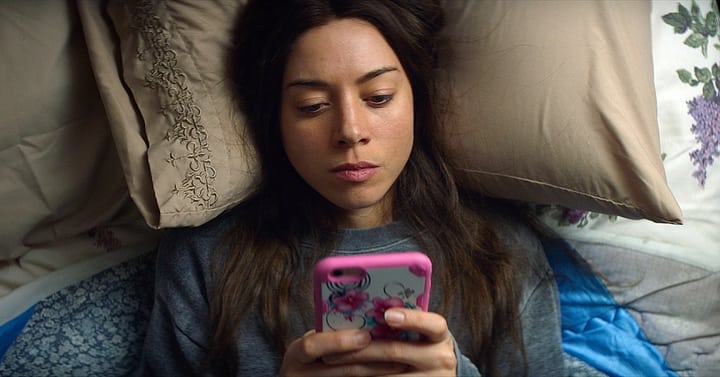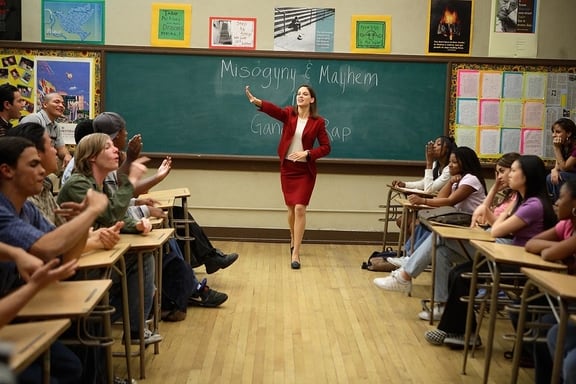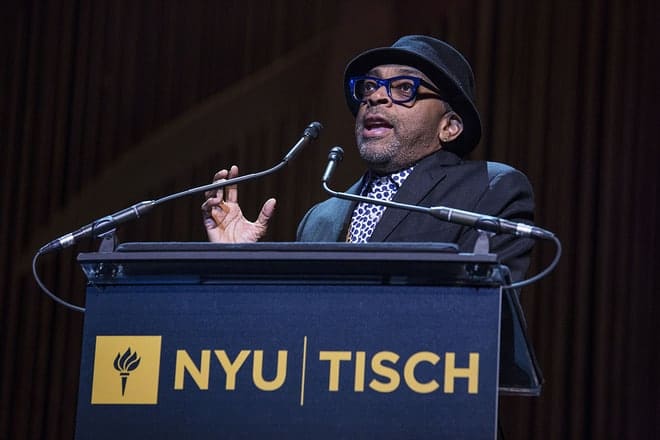“It’s all about who you know”. Anyone remotely connected to the film industry has heard that phrase. And they’ll often approach the whole subject of film networking, of making contacts, of all the hustle that’s totally separate from putting ink on paper or film in the can, with serious trepidation.
After all, unfortunately, if you are starting with fewer existing connections in the film industry, you have to work much harder to get where you want to go.
But let’s use a less cynical synonym to tackle this subject: film networking. Having a positive outlook on networking can give you the right mindset to use it effectively. How do you use it effectively, you ask? Look no further.
Table of Contents
Why and How to Maintain Your Film Network
Connections are everything in the highly competitive film industry, so you want to make sure you handle film networking seriously and strategically.
There are different ways to stand out in the industry, and being a familiar face is one of them. People are more likely to take a chance on someone they know, especially if that person expresses enthusiasm and has proven themselves reliable. Having more people in your corner increases your chances of gaining access to better opportunities.
With that said, film networking goes hand-in-hand with turning in good work and having a positive reputation. You’ll likely have established some of your early connections through a workplace. Through the work that you do, you must perform well and give people a reason to recommend you to future projects and employers.
Once you’ve built connections, it is important to maintain them. A follow-up email, lunch invite, or congratulatory message can go a long way. You never know when the right person will have the right opportunity for you. Someone you worked with in a workplace years ago could put in a good word for you based on your work ethic.
As you conduct your film networking, make sure you are not thinking of every new connection in relation to one specific opportunity. Think instead of how they can benefit you in the long run. Someone you met twenty years ago could be your saving grace tomorrow. Ensure that you are building connections that will LAST.
Know that not every connection you make is going to advance your career. Your film networking efforts will connect you with people (or, likely, hundreds of people) who you never obtain a new job through. But your network is a form of insurance that you can lean on when you need it, so you want to make sure it’s sturdy.
Longevity is key here. Maximize your possibilities and don’t let your hard work go to waste by allowing your connections to slip away from you.
The Connective Power of Social Media

Social media is good for more than sharing your travel highlights and checking up on your high school acquaintances. It’s a powerful tool for showcasing yourself as a creative (think portfolio) and connecting to other creatives. It’s therefore a great supplemental tool for film networking.
Social media is also a great way to follow up with your connections. Facebook tells you when people’s birthdays are. LinkedIn follows their career journey. They might announce an important life update through an Instagram post. These are all opportunities to reach out to your connections.
It may seem odd that recognizing these personal elements could strengthen your professional pursuits. But if you remember things about others, they will often make it a point to try and remember things about you.
Film networking can also begin at social media. Following accounts geared toward filmmakers automatically places you in association with a whole pool of other people with similar interests to yours.
Many filmmakers create social media accounts for their projects. These can speak volumes about a person’s creative vision, storytelling capabilities, and passion for their work. Interacting with these pages can earn you more connections.
As well as that, staying connected to a community can be an important way to learn, whether it be about industry tidbits or of opportunities. You don’t have to be posting selfies everyday to be keeping your ear to the ground and your eyes peeled.
Film Festivals as Networking Hubs
There is no better place for up-and-comers in the film industry to mingle and build connections than at a film festival. Such an event is full of other eager newcomers who are there specifically to expand their networks.
Whether you have a film showing at the festival or not, you have a lot to gain just by attending.
The goal: to meet as many people as you can. Festivals are set up to make film networking easy for you. From happy hours and brunches to post-screening Q&A’s to standby lines, you will have an overabundance of opportunities to chat up those around you.
Let’s piggyback on the idea of social media as a tool for connecting creatives. It’s easy to get lost in a sea of new names without faces to associate them with. A name on a phone contact doesn’t mean so much. Social media bridges the gap between the name-oriented and the face-oriented, while providing a glimpse into that person’s life and work.
As you meet people at film networking events, add them on social media. If you’re really touched by a film, see if the filmmaker has a public social platform. These are perfectly viable ways to connect with people after the film festival, which is crucial to maintaining those relationships.
Film Networking in Film School

One of the primary selling points of film school – and one of the best determinants to help you select one – is the network the school can provide its students access to. A film school’s connections can be very telling of its strength, and considering today’s sky-high tuition rates, you want to make sure you’re getting your money’s worth.
Two of the primary reasons to pursue film school are:
- To learn the craft and develop the hard skills.
- To gain connections in the industry you don’t already have.
The right school will make all the difference. A university with a very small, underdeveloped film major will likely not be very well connected in the industry. A school with a more comprehensive film program (and, ideally, with its own internal film college) is far more promising with regards to film networking.
Not all consequential film schools are located in Los Angeles and New York. Montana State University in Bozeman, for instance, is an exceedingly well-connected university despite its geographic distance from industry hotspots.
Within film school, there are three types of people who can contribute to your network: faculty, classmates, and alumni.
Faculty
Film school faculty are typically actively-working or already-accomplished creatives who can speak very directly to what it’s like to work as a filmmaker. Their careers have probably linked them to some rather promising connections.
Building connections with your professors can gain you access to their own networks. Perhaps they will let you know about a job opportunity, or an informational panel you should attend, or an event where you just might run into somebody important. They’re undoubtedly more immersed in the film world, and their job is to assist you in your own endeavors. Do not take their value for granted.
Classmates
Your classmates can also be crucial to your film networking journey in school. You are all essentially working toward the same thing and can offer skills, advice, and support to one another. Since you are all at the same stage of your careers, a classmate is likely to give you help where they can more than anyone else.
Doing a creative project together, working on the same set, or sharing a class are all scenarios in which film networking can begin. They are also chances for you and your classmates to learn from each other. Make it a point to connect with a fellow student whose work makes an impression on you, or one who exhibits genuine eagerness to learn, or any other quality you want in your collection of connections.
Alumni

Alumni networks are another great resource to turn to. Most schools will have some way to access the contact information of certain alumni. Many alumni see it as part of their duty to repay their alma mater by passing wisdom and opportunities down to later generations.
Though thought of as a rather frivolous activity, Greek Life has strong alumni networks. As do organizations such as Delta Kappa Alpha, a gender-inclusive cinema-centric fraternity. These organizations tend to align themselves to a certain core set of values, so their alumni will be more inclined to offer assistance to others who share in those values.
The reputation of a school can, on paper, make a difference. For instance, if whoever is looking at your resume also graduated from the same university as you, or has had positive experiences with past hires from your university, that could gain you extra points for consideration.
The key is not to be afraid to reach out. People in the industry are more likely to be willing to help students, or at least answer their questions. Ask, and you’ll have a much better chance of receiving.
Spreading the Wealth
Film networking goes both ways. As much as your connections are an asset to you, you are an asset to them. So, when possible, make sure to uplift those in your network. Whether it’s recommending someone you know to a past or current employer or offering your creative services to a connection’s project, it’s important to be as helpful to others as you’d want them to be to you.
You want to be assertive in your professional endeavors, but not ruthless. Film networking isn’t all about using others. The moment you make a connection, that other person has made a connection too. Part of your duty is to make the relationship of value to them, too.
Spreading the wealth can also benefit you. When you’re applying for a job, you’re trying to convince the company what you can do for them. So even if you know very well that you’re the one who needs more of a leg up, try to think of ways you can frame yourself as a useful asset.
Remember that just because you may not be as far along in your career as you’d like to be, it doesn’t mean you can’t be useful to someone who’s not yet where you are. Give them a hand in any way you can. You never know who feels lucky to have you in their network.
The notion of using who you know to get what you want can put a bad taste in one’s mouth, understandably. Instead, think of film networking in this more positive, albeit sappy way:
A key component to the human experience is the desire to connect to one another. The expansion of our professional networks is representative of all the people we have connected to. There are very real, deep ways to relate to those we forge professional bonds with. Our industry does deal in stories that relate to the human experience, after all.
In Summary
Your film network is a form of insurance. Not every connection is going to bear fruit. But building and maintaining a network is about widening the net of people who you trust and who trust you. Build, maintain and always deliver.
For those averse to social media, hearing that it’s important for networking can be unwelcome news to hear. However, using social media can manifest in a number of different ways. You don’t have to have thousands of followers to be actively engaged or even have your ear to the ground.
If you get the opportunity to attend a film festival, make the most of the chance to meet a wide variety of peers, cinephiles and industry members. It’s a rare opportunity for many different elements of the film industry to come together, so make sure you put yourself out there and try to maintain those connections you do make.
There are three different ways to network at film school, through your classmates, faculty and alumni. Always be open to collaboration and participation and always be willing to ask questions and even more importantly, listen.
This article was written by Ariana Skeeland and edited by IS Staff.
– What did you think of this article? Share It, Like It, give it a rating, and let us know your thoughts in the comments box further down…
– Struggling with a script or book? Story analysis is what we do, all day, every day… check out our range of script coverage services for writers & filmmakers.
Get *ALL* our FREE Resources
Tackle the trickiest areas of screenwriting with our exclusive eBooks. Get all our FREE resources when you join 60,000 filmmakers on our mailing list!

